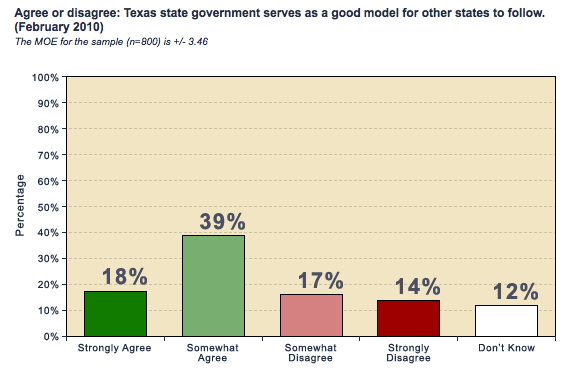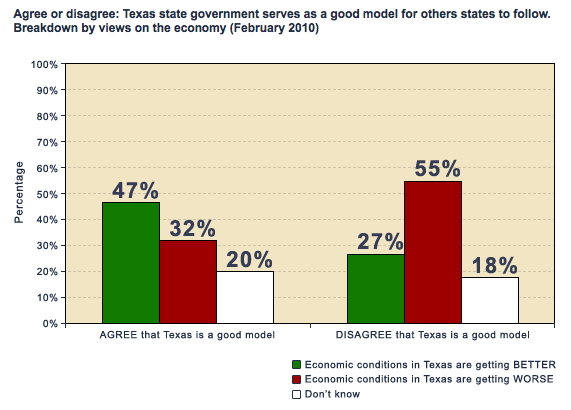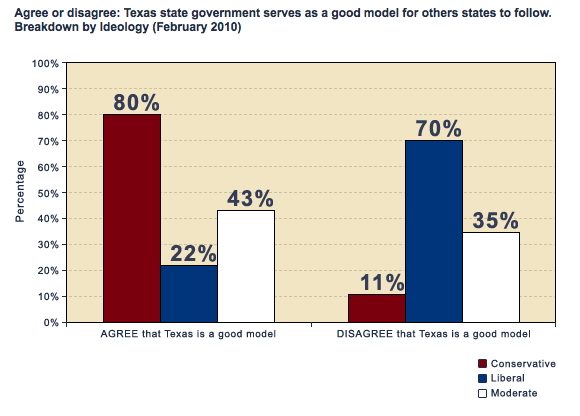The Polling Center: Is Texas a Good Economic Model?
/https://static.texastribune.org/media/images/meyers-adam.jpg)
Throughout the primary campaign season, Gov. Rick Perry touted Texas’ relatively favorable economic and fiscal position vis-à-vis other states as a vindication of his policies and, more broadly, of Texas’ low tax, low regulation model of government. Perry likely will make Texas’ comparatively strong economic performance the centerpiece of his campaign against Bill White as well. The governor’s frequent references to Texas’ better-than-average economy and comparatively low per-capita deficit are not only meant to lend support to his own re-election campaign within Texas, but are also meant to promote the Texas model as an example for policymakers elsewhere. As he says in a recent New York Times article, “What I’m really interested in doing is continuing Texas on this path and letting it be a blueprint, a road map for other states to be successful.”
Perry is by no means the only person in politics who likes to compare Texas’ fiscal and economic circumstances to those of other large states. In the wake of the national recession and the enormous fiscal crises that states across the country (most notably, California) are facing, many of the country’s most prominent conservative journalists and pundits have seized upon the Texas-California comparison as evidence that the fiscal policy model practiced in Texas is superior to the high-spending, pro-union model practiced in the blue states. (For just a few examples of these commentaries, see here, here, and here; for some push-back from liberal columnists, see here and here).
What do Texans think about these matters? Do they agree with Perry and the conservative punditry that the Texas way is the better way? In the February 2010 University of Texas/Texas Tribune statewide poll, we asked 800 residents the following question:
How strongly do you agree or disagree with the following statement: Generally speaking, the way state government runs in Texas serves as a good model for other states to follow?
Overall results for this question are presented in this table (which, like those that follow, was produced by the The Texas Politics Project at UT). Gov. Perry’s campaign will surely be pleased to know that nearly twice as many Texans at least somewhat agree with the proposition that Texas state government is a good model as at least somewhat disagree.
What accounts for these views? A reasonable hypothesis might be that views on the comparative favorability of Texas government are closely tied to views on the strength of the Texas economy. That is, we might expect people who think the Texas economy is getting better to approve of the way state government runs in Texas. This next table presents breakdowns on the question of whether Texas state government is a good model by assessments of whether the Texas economy is getting better or worse (also taken from the UT/Texas Tribune poll). As expected, respondents who agree that Texas state government is a good model are significantly more likely to say that economic conditions are getting better, and respondents who disagree that Texas state government is a good model are significantly more likely to say that economic conditions are getting worse.
Nevertheless, the relationship is not as strong as many might initially think. Thirty-two percent of respondents who believe that Texas state government is a good model also believe that economic conditions in the state are getting worse. It seems reasonable to infer that these respondents do not blame the economic woes of the state on how the state’s government functions or what its elected officials are doing. Conversely, twenty seven percent of respondents who believe that Texas government is a bad model also believe that economic conditions in the state are getting better. These respondents likely either believe that economic conditions in Texas cannot be attributed to the actions of state government, or they are judging the comparative quality of Texas state government by a standard not associated with the state’s current economic conditions.
As it turns out, a respondent’s political ideology is a far better indicator of whether he believes that Texas state government serves as a good model than is his views on the Texas economy. This final table presents breakdowns for the question of whether Texas government is a good model by political ideology. A huge gulf exists between conservatives and liberals in their answers to the questions at hand, with 80% of conservatives agreeing that Texas government is a good model for other states to follow and 70% of liberals disagreeing. Moderates, on the other hand, are more closely divided, with 43% agreeing that Texas is a good model and 35% disagreeing.
These numbers suggest that Texans’ views on whether Texas state government is a good model are heavily influenced by their overall political ideologies. Because conservatives greatly outnumber liberals in our sample (51% of respondents in our latest poll described themselves as conservative, 21% described themselves as liberal, and 28% described themselves as moderate), the overall result is that many more Texans view state government as a good model than not.
Given that Gov. Perry is likely to invoke the benefits of the Texas way in the general election, these results present a major obstacle for Bill White as his own campaign moves forward. The vast majority of Texans are self-described conservatives or moderates, and at this point, most of those Texans appear to accept Perry’s argument that Texas is doing better than other states at least in part because of the fiscal and economic policies that the state has adopted. Campaigning to dramatically overturn these policies would almost certainly not be a sound strategy for White. His range of options is therefore somewhat limited as he attempts to convince Texans that they should fire Perry and hire him instead.
Adam Myers has been research assistant for the UT-Austin Texas Statewide Poll since the summer of 2008. He is a graduate student in the Government Department at the University of Texas at Austin, and assisted in the analysis on this poll.
Texas Tribune donors or members may be quoted or mentioned in our stories, or may be the subject of them. For a complete list of contributors, click here.
Information about the authors
Learn about The Texas Tribune’s policies, including our partnership with The Trust Project to increase transparency in news.


